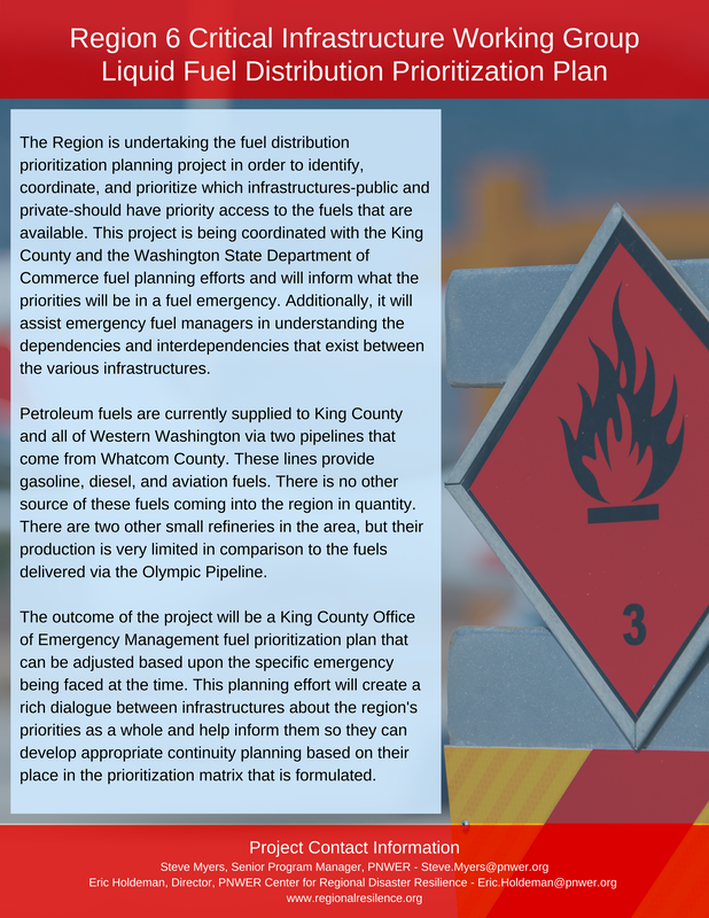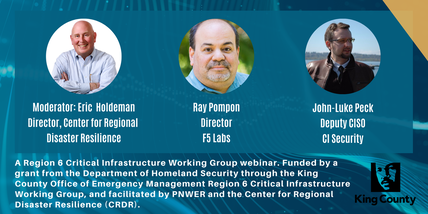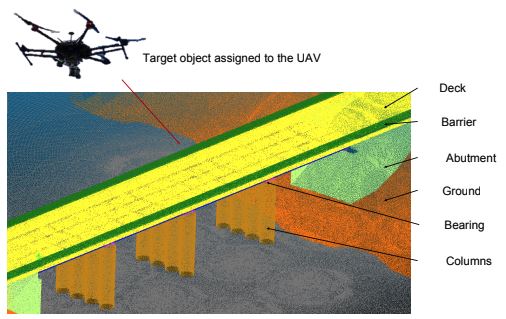|
This is an ongoing project. Please check the Liquid Fuel Planning Project page for the most up-to-date details.
0 Comments
King County Region 6 Critical Infrastructure Working Group Cybersecurity Webinar Series
Cybersecurity: Privacy and Risk
King County Region 6 Critical Infrastructure Working Group
Cybersecurity Webinar Series
Cyber Threats & Trends: Impacts to the Connected Worker Today’s workforce is more connected than ever before. The onset of COVID-19 has brought about new challenges and vulnerabilities. There has been a massive shift in the workforce to employees working from home. This webinar explored the latest threats and trends that cybersecurity professionals, policymakers, business owners, emergency managers, first responders, critical infrastructure operators, and all public and private sector stakeholders should be aware of. Experts discussed how employers can safeguard connected devices and protect employees. They explored the future of cybersecurity, latest threats, updates, resources, and cyber best practices. King County Region 6 Critical Infrastructure Working Group
Cybersecurity Webinar Series
The Ever-Changing Role of the CISO and the Future of Cybersecurity Leadership during a crisis is crucial. The Chief Information Security Officer (CISO) is an essential and dynamic position that guides organizations towards safe IT operations in today’s digital workplaces. This webinar hosted a panel of expert CISOs from the public and private sector to discuss the changing role of the position and the future of these organizations in the virtual world. Speakers explored the impact of COVID-19 on how organizations are assessing cyber risk, security, and workforce challenges, and the impact this has on the role of a CISO. They discussed ways to create more resilient organizations with better cyber hygiene in part through clear communication from leadership. Moderated by Alicia King, State of WA IT "WaTech" Speakers:
Using Drones to Detect Damage to Bridges Workshop | Critical Infrastructure Inspection Project12/13/2018 Workshop SummaryThe Pacific Northwest Economic Region and its Center for Regional Disaster Resilience in partnership with Northeastern University’s Global Resilience Institute (GRI) were awarded a 2017 National Infrastructure Protection Plan (NIPP) Security and Resilience Challenge grant for critical infrastructure. Held in Lakewood, Washington, this workshop presented the results of the technical research team (GRI) at utilizing self-directed drone technology (algorithms) and LIDAR to inspect damaged bridges in a post disaster scenario.
Unmanned Autonomous Systems (UAS) continue to be utilized in a range of industries and government agencies. As UAS/drone technology becomes more readily available, is your organization prepared to develop a professional micro-aviation program?
Webinar Overview
Unmanned Autonomous Systems (UAS) continue to be utilized in a range of industries and government agencies. As UAS/drone technology becomes more readily available, is your organization prepared to develop a professional micro-aviation program?
The Center for Regional Disaster Resilience organized a webinar addressing these issues on Oct. 23rd, 2018. Watch the webinar recording here. Speakers include:
Speakers
Workshop OverviewThe Center for Regional Disaster Resilience (CRDR) and the Pacific NorthWest Economic Region, in partnership with the Washington State Department of Transportation Aviation Division, organized a workshop geared towards working professionals in the local and state government and the private sector. The workshop focused on applications of unmanned aerial systems (UAS)/drones in Washington State and featured expert speakers, UAS users, and interactive discussions. Read the report here. OutcomesDevelopment of a regional UAS working group Inventory of activity in Washington State Identify policy, legislative and regulatory opportunities and hurdles Technical guides and references for attendees by Northeastern University's Global Resilience Institute Press ReleasePress Release from Washington State Department of Transportation July 5, 2018
Speaker PresentationsUsing LAANC For Unmanned Aerial System Pilots
The Pacific Northwest Economic Region (PNWER) and its Center for Regional Disaster Resilience (CRDR) in partnership with Northeastern University’s Global Resilience Institute (GRI) were awarded a 2017 National Infrastructure Protection Plan (NIPP) Security and Resilience Challenge grant for critical infrastructure. The project sought to develop technologies for UAS (drone) employment to technically inspect critical infrastructure in post disaster scenarios. Read the project description here. The GapThere is a need for rapid damage assessment of critical infrastructure immediately following a disaster. Emerging UAS technology is allowing for an expedited and detailed damage assessment of infrastructure such as bridges and other steel and concrete structures within the built environment. Project ScopeThis project investigated the technical capabilities of UAS to enhance the efficiency, fidelity, speed and safety of current critical infrastructure inspection methods by using machine intelligence. The policy, legislative and regulatory opportunities and hurdles were also identified. Outcomes
Technical guides and references for attendees by Northeastern University's Global Resilience Institute Events and ReportsProject Wrap-up: Critical Infrastructure Inspection Project Using Drone to Detect Damage to Bridges Workshop When: December 13, 2018 Where: Puget Sound Area More information HERE Report HERE Establishing a Professional Micro-Aviation (Drone) Program When: October 23, 2018 Where: Webinar More information HERE Report HERE Exploring Government and Private Sector Applications of UAS/Drones in Washington When: June 28, 2018 Where: Lakewood, Washington More information HERE Report HERE 2018 Pacific Northwest Disaster Resilience Symposium When: July 23, 2018 Where: Spokane, Washington More information HERE Report HERE ContactsEric Holdeman, Director, CRDR,
253-376-6683, [email protected] Philip Anderson, PhD, Associate Director for Research and Innovation, GRI, (703) 772-0132, [email protected] Puget Sound Regional Catastrophic Preparedness Grant Program: |
Categories
All
Archives
October 2021
|





